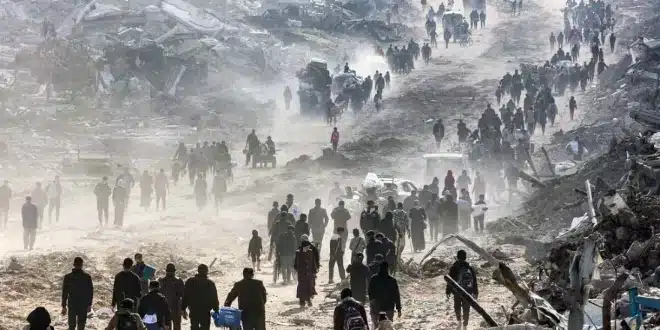Israel has agreed to a new ceasefire initiative presented by the United States, according to the White House, marking the latest attempt to broker a pause in the prolonged war with Hamas. The development was announced as negotiations continue to focus on securing the release of remaining hostages in exchange for concessions that could bring relief to Gaza’s besieged population.
U.S. Special Envoy Steve Witkoff had earlier expressed optimism regarding the possibility of securing a temporary halt to the fighting. His proposed framework is designed to facilitate a pause in hostilities and establish conditions for a broader truce agreement. According to White House Press Secretary Karoline Leavitt, Israel has fully endorsed the American proposal.
Hamas, however, responded with skepticism. While refraining from issuing a definitive rejection, the group indicated it would review the draft more thoroughly before providing a formal reply. Senior Hamas figure Bassem Naim criticized the proposal as preserving occupation and prolonging both violence and humanitarian suffering. He emphasized that the group’s demands, including a full ceasefire and an end to food insecurity in Gaza, had not yet been met. Nevertheless, he stated that Hamas would assess the plan seriously in the context of national interest.
Key Issues in Ongoing Truce Negotiations
Hamas had previously acknowledged that it reached a preliminary understanding with the U.S. mediator regarding a potential framework for de-escalation. That plan included the withdrawal of Israeli forces from Gaza, increased aid delivery, and the formation of a nonpartisan Palestinian governing body to manage post-conflict reconstruction.
Prime Minister Benjamin Netanyahu has reiterated that Israel’s war objectives remain unchanged. These include the complete dismantling of Hamas, the permanent disarmament or exile of its fighters, and the return of all hostages. He has also stated that Israel intends to maintain indefinite control over Gaza and has discussed the idea of facilitating voluntary emigration of its residents, a proposal widely condemned by Palestinians and the broader international community.
In contrast, Hamas continues to hold 58 hostages and has maintained that it will only release them in exchange for major concessions. These include a permanent ceasefire, the release of a large number of Palestinian prisoners, and a full Israeli withdrawal from Gaza. The group has also proposed ceding political power to an independent Palestinian administration.
Discussions have been stalled for months over the central point of whether the ceasefire should be temporary or permanent. Israel has favored short-term pauses to allow for hostage exchanges, while Hamas has insisted that any further negotiations must lead to a durable end to the conflict. Mediation efforts, led by the United States, Egypt, and Qatar, have so far failed to bridge this gap.
Details of the Latest Ceasefire Draft
While the full contents of Witkoff’s proposal remain undisclosed, details confirmed by sources close to the negotiations outline a 60-day pause in fighting. During this period, Hamas would release 10 living hostages as well as the remains of others, in exchange for the release of over 1,100 Palestinian prisoners, including 100 serving lengthy sentences for violent offenses.
Additionally, the plan includes a significant increase in humanitarian aid, with hundreds of trucks carrying essential goods permitted to enter Gaza each day. These deliveries are aimed at alleviating severe food shortages, which experts warn have pushed the region to the brink of famine due to nearly three months of intensified blockade. Israeli forces would also reposition to areas they held prior to resuming military operations in March.
The agreement reportedly includes guarantees that serious negotiations toward a permanent truce will take place during the ceasefire and that Israel will not renew its military campaign immediately after any hostage releases.
Obstacles to a Lasting Resolution
The conflict began on October 7, 2023, when Hamas-led fighters launched a large-scale assault into southern Israel, killing approximately 1,200 people and capturing 251 hostages. In response, Israel initiated a sustained military offensive in Gaza. More than 54,000 Palestinians have been killed in the campaign, according to the Gaza Health Ministry, which does not distinguish between civilian and combatant deaths.
The assault has left wide swaths of Gaza in ruins, with roughly 90 percent of the territory’s population displaced. Hundreds of thousands now live in makeshift shelters, including tents and repurposed school buildings, with basic services severely limited.
Hamas’s military capabilities have been significantly diminished, and most of its senior leadership in Gaza has been killed or captured. However, the group is reluctant to release its remaining hostages without securing a permanent end to hostilities, fearing it could otherwise face renewed and potentially more intense Israeli attacks.
For its part, Israel remains concerned that halting the war now would leave Hamas with continued influence in Gaza, even without formal governance. Security officials fear the group could regroup and plan future operations similar to those launched last October.
Political dynamics further complicate decision-making in Israel. Prime Minister Netanyahu faces mounting pressure from far-right factions within his governing coalition, which have threatened to withdraw their support if the war ends prematurely. A collapse of his government would leave him vulnerable to ongoing corruption proceedings and public scrutiny over the state’s failure to prevent the October attack.
Long-Term Peace Remains Elusive
Despite the short-term focus on hostage negotiations and temporary ceasefires, prospects for resolving the wider Israeli-Palestinian conflict appear bleak. The Palestinian leadership remains fragmented, while Israel’s current administration is the most hardline in its history, staunchly opposing the establishment of a Palestinian state in Gaza, the West Bank, and East Jerusalem—areas occupied by Israel since the 1967 war.
Formal peace negotiations have been dormant for more than 15 years, and current diplomatic channels show no signs of producing a comprehensive resolution. As humanitarian conditions continue to deteriorate in Gaza, and with tensions still high in Israel, the international community remains deeply concerned about the enduring cycle of violence and instability.


